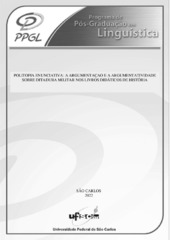| dc.contributor.author | Machiaveli, Gabriel Reis Moraes | |
| dc.date.accessioned | 2022-09-29T18:19:50Z | |
| dc.date.available | 2022-09-29T18:19:50Z | |
| dc.date.issued | 2022-08-31 | |
| dc.identifier.citation | MACHIAVELI, Gabriel Reis Moraes. Politopia Enunciativa: a argumentação e a argumentatividade sobre Ditadura Militar nos livros didáticos de história. 2022. Tese (Doutorado em Linguística) – Universidade Federal de São Carlos, São Carlos, 2022. Disponível em: https://repositorio.ufscar.br/handle/ufscar/16743. | * |
| dc.identifier.uri | https://repositorio.ufscar.br/handle/ufscar/16743 | |
| dc.description.abstract | This work intends to investigate, describe and interpret the meaning of Military Dictatorship in history textbooks, available by the Ministry of Education (MEC) to public schools in Brazil. Knowing how the production of meaning on the subject is urged and taught, through textbooks, is justified by the huge demand that textbooks represent in the lives of Brazilians. Thus, we adopted for description and analysis the Semantics of Event (2002; 2007; 2011; 2013; 2018), coined by the linguist Eduardo Guimarães (UNICAMP). We understand the use of the word as an enunciation event integrated by temporalities that make it mean. We collected for analysis five textbooks, distributed through the National Textbook Program (PNLD), between the years 2016 to 2020. Taking into account the configuration of argumentation and argumentativity in the Semantics of Event theory, we conclude that the meaning of Dictatorship Military in the books presented himself as partially stabilized, being described by a chronological narrative that addresses the coup to the amnesty process. Military dictatorship was determined, in all books, by communist threat, political repression, torture and censorship. Another highlight are the ways in which the Speaker comments on his own saying, with the use of articulators in addition, even, among others, that presented a mobilization between the social place of saying, the Speaker and the enunciators. This argumentative construction allowed us to see when there was an escape from a universal narrative, that is, when other enunciators appeared beyond the universal, as collective enunciators (the military, the opposition, among others) and individual enunciators (such as those in which the use of articulators illuminated its appearance). | eng |
| dc.description.sponsorship | Coordenação de Aperfeiçoamento de Pessoal de Nível Superior (CAPES) | por |
| dc.language.iso | por | por |
| dc.publisher | Universidade Federal de São Carlos | por |
| dc.rights | Attribution-NonCommercial-NoDerivs 3.0 Brazil | * |
| dc.rights.uri | http://creativecommons.org/licenses/by-nc-nd/3.0/br/ | * |
| dc.subject | Semântica | por |
| dc.subject | Argumentação | por |
| dc.subject | Argumentatividade | por |
| dc.subject | Enunciação | por |
| dc.subject | Semantics | eng |
| dc.subject | Argumentation | eng |
| dc.subject | Argumentivity | eng |
| dc.subject | Enunciation | eng |
| dc.title | Politopia Enunciativa: a argumentação e a argumentatividade sobre Ditadura Militar nos livros didáticos de história | por |
| dc.title.alternative | Enunciative polytopy: argumentation and argumentativity about military dictadorship in history textbooks | eng |
| dc.type | Tese | por |
| dc.contributor.advisor1 | Silva, Soeli Maria Schreiber da | |
| dc.contributor.advisor1Lattes | http://lattes.cnpq.br/8794598988783452 | por |
| dc.description.resumo | Este trabalho pretende investigar, descrever e interpretar o sentido de Ditadura Militar nos livros didáticos de história, disponíveis pelo Ministério da Educação (MEC) às escolas públicas do Brasil. Fazer saber como a produção de sentido sobre o tema é instado e lecionado, por meio dos livros didáticos, se justifica pela enorme demanda que os livros didáticos representam na vida dos brasileiros. Dessa forma, adotamos para descrição e análise a Semântica do Acontecimento (2002; 2007; 2011; 2013; 2018), cunhada pelo linguista Eduardo Guimarães (UNICAMP). Entendemos o uso da palavra como um acontecimento da enunciação integrado por temporalidades que o fazem significar. Coletamos para análise cinco livros didáticos, distribuídos através do Programa Nacional do Livro Didático (PNLD), entre os anos de 2016 a 2020. Levando em conta a configuração da argumentação e a argumentatividade na teoria da Semântica do Acontecimento, concluímos que o sentido de Ditadura Militar nos livros se apresentou como parcialmente estabilizado, sendo descrito por uma narrativa cronológica que aborda do golpe ao processo de anistia. Ditadura Militar foi determinada, em todos os livros, por ameaça comunista, repressão política, torturas e censuras. Outro ponto de destaque são as formas como o Locutor comenta o seu próprio dizer, com o uso dos articuladores além disso, até, entre outros, que apresentaram uma mobilização entre o lugar social de dizer, o Locutor e os enunciadores. Essa construção argumentativa nos permitiu enxergar quando houve uma fuga de uma narrativa universal, isto é, quando apareceram outros enunciadores além do universal, como enunciadores coletivos (os militares, a oposição, entre outros) e individuais (como aqueles em que o uso dos articuladores iluminaram seu aparecimento). | por |
| dc.publisher.initials | UFSCar | por |
| dc.publisher.program | Programa de Pós-Graduação em Linguística - PPGL | por |
| dc.subject.cnpq | LINGUISTICA, LETRAS E ARTES::LINGUISTICA | por |
| dc.description.sponsorshipId | 88882.426860/2019-01 | por |
| dc.publisher.address | Câmpus São Carlos | por |
| dc.contributor.authorlattes | http://lattes.cnpq.br/5631543518951987 | por |


